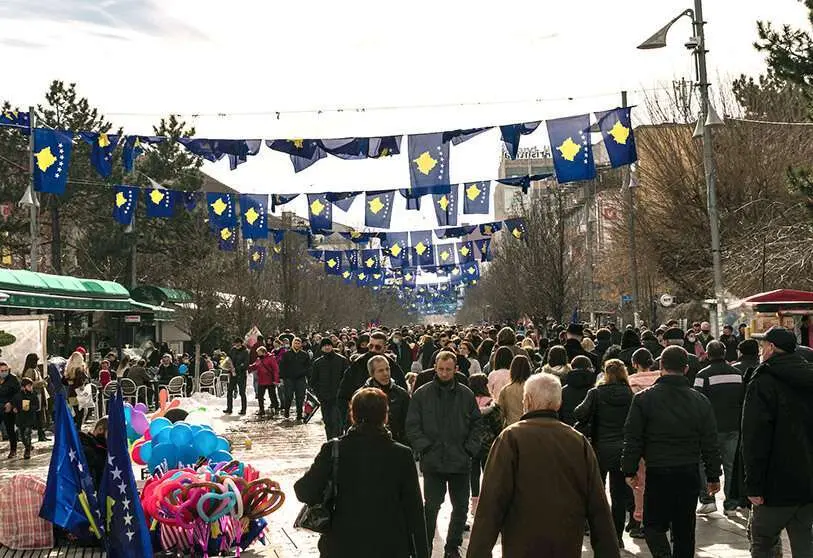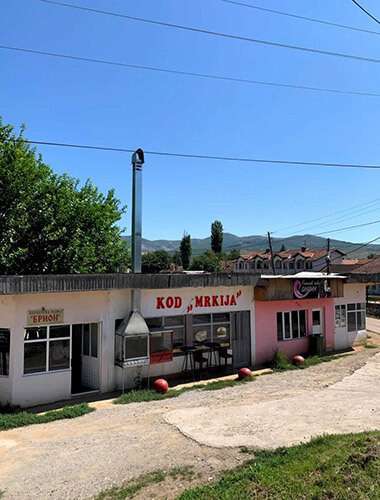Being a Serb in Kosovo

"Belgrade residents feel that Kosovo Serbs have lived too long in the company of Muslims". In a conversation with a Serbian landowner, an English professor working in Pristina at the time asked about the problem of Serbs leaving Kosovo.
The landowner says they are half-black because they come from Kosovo. They claim they are dirty and call them Muslims. Many of them go back to Kosovo. They are Kosovars. Miranda Vickers wrote in her book 'Between Serb and Albanian. A History of Kosovo' in which she analyses this conflict that has been present in the Balkans since before even the formation of Yugoslavia.

Kosovo declared its independence more than thirteen years ago. Serbia refuses to accept this despite requests from the international community. However, the two sides have been meeting in recent years in order to respond to each other's interests, and certain issues still keep them at loggerheads; independence is the most important, but not the only one. Serbia's influence over Kosovo Serb communities is another contentious issue. Thus, Serb-majority areas of the country remain only partially integrated and are a potential source of violence. Serbs elected to Kosovo's parliament and appointed to government posts openly follow Belgrade's orders.
Kosovo is a territory of confluence of communities, although all of them remain at the centre of the conflict between Albanians and Serbs, the largest communities in the country. According to the last recorded census in the territory, conducted in 2011, all of which have since been sabotaged by the Albanian community, and which excludes the north of the country, the main minority groups are Bosniaks (1.6 percent), Serbs (1.5 percent), Turks (1.1 percent), Ashkali (0.9 percent), Egyptians (0.7 percent), Gorani (0.6 percent) and Roma (0.5 percent). However, since this census does not count the population in the Serb-majority north of the country, estimates based on OSCE data from 2010 and 2013 estimate that there were 146,128 Serbs living in Kosovo, representing 7.8 per cent of the total population: of these, 70,430 were in northern Kosovo and 75,698 in southern Kosovo, with a total of 10 municipalities where Serbs are in the majority.

Thus, the Serb and Albanian communities are divided. Relations between the two ethnicities rarely take place, let alone in a social context. Kosovo Serbs do not speak Albanian or leave their respective municipalities, and Albanians who know Serbian are rare. Young Serbs go to different schools where they study in their respective languages and the contents are decided from Belgrade. As for jobs, it is true that most of the public jobs are given to Albanians, although because of the language. It is the opposite in Serbian municipalities, where official positions are held by Serbs.
All these facts make the division between communities rule the reality of the country. Not only that, but this separation of communities makes Serbs live in a kind of limbo, where they do not seem to belong anywhere.

Marko moved from Belgrade to Gracanica, a municipality just 9 kilometres from Pristina where 67.7% of the population is Serb, with six years, the young man like most locals does not care about the tensions between the two countries but "to have all the same rights as those Serbs living elsewhere, instead of being limited". He refers to the fact that Serbs living in Kosovo are not granted Serbian passports. In order to get a Serbian passport, they need to be resident in Serbia for more than a year, something the police themselves certify every few months. "If [Serbia] would at least give us what we need, even if it were to please the Kosovo Serbs, I could say that it's not exactly independent," the young man explains about the Balkan country's independence.
Not only that, but the government in Pristina has no control over the mostly Serbian northern parts of the country, which are openly answerable to Belgrade. This means that, for example, electricity in these areas is supplied free of charge by the Pristina government, as there is no Serb company accredited to distribute and connect to the Kosovo energy authorities in these areas, and Serbs claim they "do not know where to make the payment". This has led many Albanians to move to these areas, further increasing clashes between the two communities.

Marko admits that he has not had any altercations for being a Serb in Kosovo, but "I do hear of others who seem to have been beaten or insulted for speaking Serbian". The young man admits that when he goes to Pristina, he always speaks English and that he does not imagine his mother in the capital, "she doesn't leave Gracanica".
This may be the main difference between the generations, the philosophy student admits that "there is a big overall leap" in terms of interaction between the two communities. "Young people are more open as far as a Western perspective is concerned, to those ideas that progress brings, such as interaction with everyone," Marko reflects. Rita (not her real name at the request of the source), an Albanian from Presheva, a municipality east of Pristina where both communities coexist, disagrees. She sees no difference with her elders in terms of interaction with the Serb community and admits that she does not interact with Serbs, "in school, for example, there was a group, but they were always separated from the rest, and we didn't really socialise with them", she recalls.

Kosovo's independence may be the main focus of the conflict between Pristina and Belgrade, but for the Albanian and Serb communities, it is rather those memories of the war that "hurt us. That's why even the younger generation doesn't want to relate to them happily. There are so many families without a father, uncle, grandfather because of them...", laments Rita.
Communication between the two communities is practically non-existent. Only in Mitrovica, where a bridge separates the two communities, can a certain rapprochement be seen, in the rest of the areas where Albanians and Serbs live together, there is no contact between the two communities. Even in the capital itself.

Tomas is from Belgrade, although he moved to Pristina months ago; the young man is a Serbian translator and jokes that he is "a Serb traitor". He himself admits that his own country "does not admit facts", when asked about the genocide. The young man explains that he does not have many Serb acquaintances in Kosovo, "you could say that my perspective on Kosovo is much more Albanian. I remember I was seventeen when it became independent, and I automatically thought it was the logical thing to do".
Tomas specialises in Slavic studies and has been immersed in Albanian culture and language for years. Therefore, he understands the different views of Marko and Rita, "the Albanians have the memory of what happened and are still dealing with it, the Serbs don't". It is therefore logical that for the latter interaction is possible, but not for the former. Rita admits that she does not know if she would have Serb friends, "it would be complicated". Marko, on the other hand, is happy to say that his best friend is Albanian. "If Serbs came here, stopped to talk to Albanians and saw that there is no one who hasn't lost someone to the war, they would start to recognise things", says the young man from Belgrade.

In recent days, tensions between Belgrade and Pristina seem to have been rekindled by new vehicle transit measures that require Serbian cars to change their number plates to enter Kosovo. This is what Kosovo has been doing for more than ten years. However, this matters little to the populations. They are still dealing with the consequences of the war, the economic crisis and the increase in youth unemployment, which is already over 40 per cent. For days, experts in the region have been describing everything that happens at the border as 'theatre', but for Tomas it is more like "a circus" that "the Serbian government likes to create from time to time". What these measures do, however, is to further highlight the limbo in which Serbs in Kosovo live. They do not feel part of Kosovo, but Serbia makes them see that they are not part of its territory either. As Marko explains, "what they are doing is limiting us; our own countries are limiting us".
Whether an artificial problem or a new chapter in the main Balkan conflict, tensions between Serbia and Kosovo are far from over. Like the situation in Kosovo, it is far from stabilising; its recognition and acceptance depend on these conflicts coming to an end, and no one can imagine a Serbian government accepting the demands of what it still considers its province. More importantly, there is still a long way to go before these two communities forget the past and decide to live side by side with their next-door neighbour, which in any case prevents Kosovo's recognition. As Tomas says, "this is a movement that has to come from the people. When all Kosovars recognise it, Serbia will have no choice but to recognise it".








